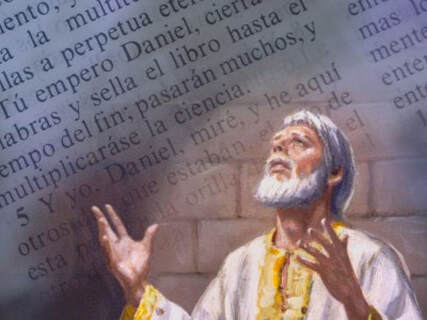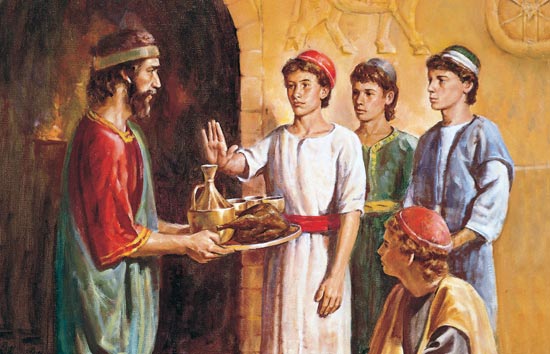First, let me give you a little historical context.
In 605 BC, Babylon invaded Israel and absolutely laid the smack down, seemingly bringing their nation to an end. And according to historical records from that time period, when one nation conquered another, it was often quite brutal, with thousands of people either getting slaughtered or being forced into slavery.
One of the saddest parts of this tragic situation is that it could have been avoided. The nation of Israel had begun walking away from God hundreds of years earlier, and over and over again He tried to get their attention by sending prophets to try to correct them and set them on the right path. However, they continually refused to listen, and because of their rebellion, He allowed the Babylonians to invade.
They arrived with a force unlike anything Israel had ever seen and brought destruction like nothing they’d ever experienced.
The Babylonians would invade a nation and then seek the best and brightest young menin the society they’d conquered and try to force these men into a life of slavery.
After the Babylonians invaded, they likely allowed the poorest people to stay in Israel and work the fields and vineyards; however, they probably killed the others so they wouldn't have to worry about an uprising.
Daniel 1:3-7 NIV Then the king ordered Ashpenaz, chief of his court officials, to bring into the king’s service some of the Israelites from the royal family and the nobility— young men without any physical defect, handsome, showing aptitude for every kind of learning, well informed, quick to understand, and qualified to serve in the king’s palace. He was to teach them the language and literature of the Babylonians. The king assigned them a daily amount of food and wine from the king’s table. They were to be trained for three years, and after that they were to enter the king’s service. Among those who were chosen were some from Judah: Daniel, Hananiah, Mishael and Azariah. The chief official gave them new names: to Daniel, the name Belteshazzar; to Hananiah, Shadrach; to Mishael, Meshach; and to Azariah, Abednego.
Daniel must have seen some of his friends and family members murdered right in front of him at the hands of Babylonians.
After killing his fellow countrymen before his very eyes, Daniel’s enemies marched him across a couple of deserts from Israel to Babylon (in modern-day Iraq). Then they forced him to change his language, gave him a new wardrobe, and set out to completely change his identity.
Daniel refused to allow his circumstances to shape his belief system but rather allowed his belief system to help him overcome his circumstances.
The Babylonians were trying their best to make Daniel a slave, just as our circumstances often attempt to enslave us. However, we see something near the beginning of the story that changes everything:
Daniel 1:8 NIV But Daniel resolved not to defile himself with the royal food and wine, and he asked the chief official for permission not to defile himself this way.
Remember from verse 5 that the food that they were given was from the king's own kitchen.
Daniel 1:5 NIV The king assigned them a daily amount of food and wine from the king’s table. They were to be trained for three years, and after that they were to enter the king’s service.
Something to keep in mind was that Babylon was a polytheistic culture, meaning they worshiped many gods. It was quite common for the food and wine that came out of the king’s kitchen to have first been put in front of the Babylonian gods as an act of worship. Then, after the food was presented to the gods, it was served to the king and his court.
If you ate the king’s food or drank his wine, you were publicly saying, “I am a worshiper of the gods of Babylon.”
Daniel refused to cross that line. It was like he was saying, “You can invade my country, kill my family and friends, march me across a desert, change my name, give me a new language to learn, and force me into a new way of life, butI will not acknowledge or worship another god, because my God is greater than the circumstancesI am going through.”
They had changed his name from Daniel, which means “God is my judge” to Belteshazzar which means “Baal saves” or “Baal saves my life.” In that culture, if you changed someone’s name, then you were essentially changing his identity. They were trying to make Daniel and his friends slaves. The symbolism here is huge: Daniel never took on the identity of a slave!
Daniel 1:9-10 NIV Now God had caused the official to show favor and compassion to Daniel, but the official told Daniel, “I am afraid of my Lord the king, who has assigned your food and drink. Why should he see you looking worse than the other young men your age? The king would then have my head because of you.”
Now God had given the chief of staff both respect and affection for Daniel. When Daniel told him that he wouldn’t eat the king’s food, he told Daniel that “I am afraid of my lord the king, who has ordered that you eat this food and wine. If you become pale and thin compared to the other youths your age, I am afraid the king will have me beheaded” (Daniel 1:10).
Anytime you make up your mind that you aren’t going to compromise God’s will the world is going to put pressure on you to compromise.
Let’s take a look at how things worked out for Daniel.
Daniel 1:11-21 NIV Daniel then said to the guard whom the chief official had appointed over Daniel, Hananiah, Mishael and Azariah, “Please test your servants for ten days: Give us nothing but vegetables to eat and water to drink. Then compare our appearance with that of the young men who eat the royal food, and treat your servants in accordance with what you see.” So he agreed to this and tested them for ten days. At the end of the ten days they looked healthier and better nourished than any of the young men who ate the royal food. So the guard took away their choice food and the wine they were to drink and gave them vegetables instead. To these four young men God gave knowledge and understanding of all kinds of literature and learning. And Daniel could understand visions and dreams of all kinds. At the end of the time set by the king to bring them into his service, the chief official presented them to Nebuchadnezzar. The king talked with them, and he found none equal to Daniel, Hananiah, Mishael and Azariah; so they entered the king’s service. In every matter of wisdom and understanding about which the king questioned them, he found them ten times better than all the magicians and enchanters in his whole kingdom. And Daniel remained there until the first year of King Cyrus.
Daniel stood firm on his convictions and refused to compromise—yet God didn’t deliver him from his circumstances. Instead, He delivered him through his circumstances.
Daniel spoke with the attendant who had been appointed by the chief of staff to look after Daniel, Hananiah, Mishael, and Azariah. “Please test us for ten days on a diet of vegetables and water,” Daniel said. “At the end of the ten days, see how we look compared to the other young men who are eating the king’s food. Then make your decision in light of what you see.” The attendant agreed to Daniel’s suggestion and tested them for ten days.
At the end of the ten days, Daniel and his three friends looked healthier and better nourished than the young men who had been eating the food assigned by the king. So after that, the attendant fed them only vegetables instead of the food and wine provided for the others.
God gave these four young men an unusual aptitude for understanding every aspect of literature and wisdom. And God gave Daniel the special ability to interpret the meanings of visions and dreams.
When the training period ordered by the king was completed, the chief of staff brought all the young men to King Nebuchadnezzar. The king talked with them, and no one impressed him as much as Daniel, Hananiah, Mishael, and Azariah. So they entered the royal service. Whenever the king consulted them in any matter requiring wisdom and balanced judgment, he found them ten times more capable than any of the magicians and enchanters in his entire kingdom.
Daniel remained in the royal service until the first year of the reign of King Cyrus.
The same God who delivered Daniel can do the same for you. He is not threatened by our circumstances or situation—He is a grave-robbing, water-walking, miracle-working, death-defying God, and He’sable to pull you through anything you have to face in this life.
Nebuchadnezzar’s Threat
One night, Nebuchadnezzar awoke frightened by a dream. The king called for his magi to interpret the nightmare. This was standard procedure in a culture that placed a high importance on dreams and their meaning. However, he added an unprecedented requirement: “Tell me what my dream was and interpret it” (Daniel 2:5). So, not only did the royal wise men have to provide the interpretation of the dream, they had to recount the dream itself. The penalty for failure was death: every magician, enchanter, sorcerer and astrologer in the kingdom would be executed. The worried magi replied, “What the king asks is too difficult. No one can reveal it to the king except the gods, and they do not live among men” (Daniel 2:11). When Daniel heard of this, he was determined to prove God’s power to the king (Daniel 2:18).
Daniel’s Response: The Dream
Daniel asked the king for some time to discover the dream, and then he proceeded to pray all night with three of his fellow exiles. God revealed the dream to him, and Daniel and his friends praised God (Daniel 2:19-23). The next morning, he went to the king and told him about the dream.
The dream featured a huge, glorious statue of a man. Its head was “made of pure gold, its chest and arms of silver, its belly and thighs of bronze, its legs of iron, its feet partly of iron and partly of baked clay” (Daniel 2:32-33). Then a rock cut “not by human hands” (Daniel 2:34) hit the foot of the statue, and the whole image “became like chaff on a threshing floor,” while the rock “became a huge mountain and filled the whole earth” (Daniel 2:35). This vision, by the way, gives us our modern idiom “feet of clay,” meaning “a hidden fault or weakness.”


 RSS Feed
RSS Feed